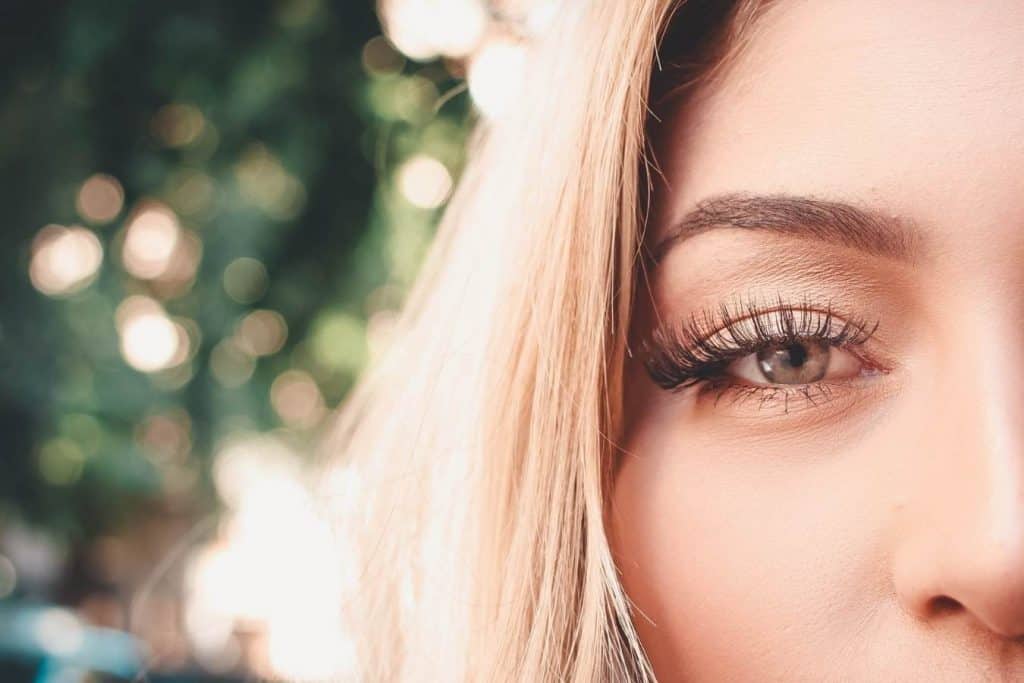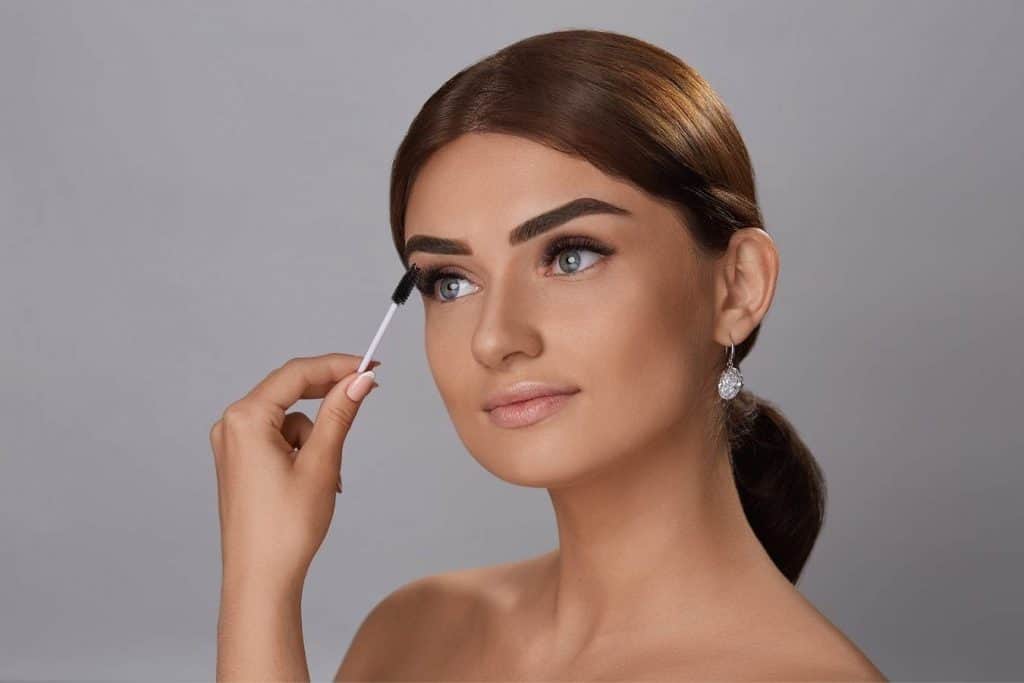You may start to notice that your once-luscious set of lashes is starting to look shorter and thinner. But can your eyelashes actually become shorter?

Yes, your eyelashes can become both thinner and shorter as you age. There are a number of different factors, such as medication or bad habits with removing makeup, that may also cause your eyelashes to fall out.
It’s difficult to say what constitutes a normal number of eyelashes.
Typically, people will have around 70 – 80 lashes on the lower line, and anything from 90 – 160 on the upper eyelid.
This will vary depending on what stage of the eyelash growth cycle your eyelashes are in, but it’s a good average to stick with.
Eyelashes are there to protect your eyes from debris and environmental hazards.
They’re essential for the overall healthy functioning of your eyes.
If your eyebrows start to become shorter or thin out, you may experience more irritation in your eyes.
This article will outline why your eyebrows can become shorter or thinner, and help you develop habits to avoid exacerbating this.
Do Eyelashes Thin With Age?
One of the effects of aging is hair loss and thinning as a result of hormonal imbalance. This can cause your eyelashes (and even your eyebrows) to thin with age.
As our bodies age, we go through various hormonal shifts.
One of the major side effects of these hormonal disruptions (particularly a drop in estrogen) can be hair loss and thinning.
This extends from the hair on your scalp to the hair on other areas of your body, including your eyelashes.
The follicles of your eyelashes are less stimulated as the hormones drop, which slows down your lash growth as a result.
Can Your Eyelashes Become Shorter?

Your eyelashes can become shorter and thinner. There are a number of reasons why this may occur, from poor removal of make-up to rubbing your eyelashes, through to genetic reasons and aging.
This can impair the protective function that your eyelashes serve.
You may experience dryer eyes, or find that your eyes become more irritated by debris getting into them.
If this becomes a serious problem, it’s worth seeking out the advice of your physician, who should be able to recommend steps that you can take in order to support the normal function of your lashes.
Do Eyelashes Get Shorter With Age?
Just as your eyelashes can become thinner with age, they can also become shorter. You’ll notice that you have fewer lashes, and will find that the ones you have are less dense and lack volume.
If you’re keen to minimize this shortening and thinning of your lashes, there are things that you can do.
The key is to get in there early because once your lashes begin to drop as a result of age, they’re harder to rebuild.
You want to be integrating proper lash care into your routine in your twenties and thirties.
This is a good habit to get into as early as possible, as it will ensure you’re supporting your lashes before the aging process starts to impede their growth.
Keep reading for information on what you can do to care for lashes.
6 Reasons Why Eyelashes May Fall Out Or Appear Thinner

1. Genetics
Sometimes, you can be doing everything right and still experience hair loss and hair thinning as a result of your genetics.
Male pattern baldness or female pattern baldness will cause your eyelashes to become shorter or thinner.
2. Poor use of cosmetics
Think about it – if you’re aggressively rubbing your eyes when you remove your makeup, you’re not giving your eyelashes a fighting chance.
They’re far more likely to fall out, which will result in shorter and thinner lashes and an uneven distribution on your eyelids.
Ensure that you use a gentle cleanser and don’t scrub too hard.
Always remember to take your makeup off before you go to bed. Mascara hardens over time, and if you sleep with it on, your lashes will feel brittle in the morning and are more likely to break.
If you’re a fan of eyelash extensions, you’ll know that your technician will use glue to attach them to your natural lashes.
If you pull these extensions off before they’re ready to fall off, you’ll be tugging at your natural lashes, too.
This will result in thinning or shortening. If you’re determined to remove the extensions, use an oil-based cleanser, as this can help to soften the glue.
3. Hormones
The link between aging and hair loss is well established.
The growth cycle of your hair follicles is impacted by changes to estrogen and testosterone levels during menopause, which will make your eyelashes thin or become shortened.
Similarly, if you’re pregnant, your body is also undergoing huge hormonal fluctuations. This can also lead to hair loss and shedding, which may impact the eyelashes.
4. Medications
Particular medications may lead to your eyelashes becoming shorter or thinner.
Chemotherapy, for example, will incite hair loss all over the body, and this will likely impact the eyelashes.
5. Illness or other conditions
From eye infections to vitamin deficiencies and allergic reactions, your eyelashes can be impacted by a host of different illnesses and conditions.
If you experience an underactive or overactive thyroid, this can impact hair growth.
So can skin conditions like psoriasis or eczema, as these will interrupt the lashes’ normal growth cycle.
Individuals who experience excessive stress or anxiety can compulsively pull out their eyelashes, too.
The condition of blepharitis – where mites and bacteria infect the lash line – will cause eyelashes to thin and shorten.
Madarosis will work similarly, as this condition results in the disruption of the hair follicle.
Both of these conditions require serious medical assistance, so are worth consulting your physician about.
6. Rubbing
In the same way that aggressive scrubbing with eye make-up remover can cause eyelashes to become shorter or thinner, over-rubbing your eyes will result in lashes falling out.
Avoid tugging at them, too, no matter how stressed you feel.
How To Maintain And Grow Thick Eyelashes

1. Wear mascara – but use a gentle eye make-up remover
Working mascara and eyeliner to your advantage is a great way to make your eyelashes appear fuller.
You could even purchase a thickening mascara and a lash primer to help define and condition your lashes.
Remember to use a gentle make-up remover – oil-based or cream formulas are most likely to be best, and you could even use unrefined coconut oil.
Just avoid scrubbing or rubbing at all costs, and always remove your eye make-up before bed.
2. Falsies
False eyelash extensions are a great way to add some volume and length to your lashes.
You can choose from lashes made from a variety of materials and can opt for either using at-home extensions or head to an eyelash technician for more natural-looking extensions, depending on your preference.
3. Growth serums
There are so many lash growth serums available that you could use.
They’ll condition your lashes and fortify them with nutrients and vitamins to support their health and encourage growth.
Look for ingredients including amino acids, plant extracts, vitamin E, and peptides. You may also find some with proteins like keratin or biotin in there.
Just be sure to do your research and always patch test prior to application so as to be sure you won’t experience any irritation.
Alternatively, Latisse is an FDA-approved prescription drug.
It’s an ointment that your physician or dermatologist can prescribe, but it is expensive, and you have to keep using it in order to maintain your newly long lashes.
4. Use an overnight mask
Whether it’s coconut oil, Vaseline, olive oil, or castor oil, there are a number of ways to moisturize and nourish your lashes overnight.
Apply with a clean mascara wand, go to sleep, and wake up with newly strengthened eyelashes. Just remember to wash the oil off prior to applying any make-up.
5. Supplements and diet
There are supplements and vitamins available that purport to support the healthy growth of hair.
Anything with vitamins A, B, C, D, and E is great. You would also do well to include zinc and iron.
